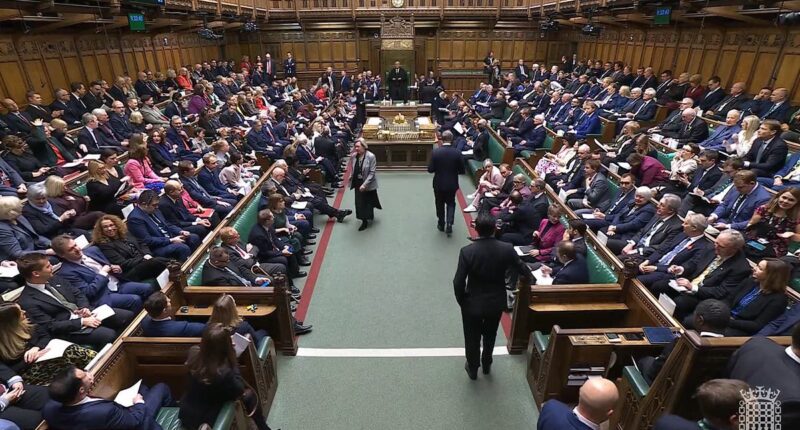
Today, members of Parliament supported a proposal for assisted dying as a significant law passed its initial stage in the House of Commons after a five-hour discussion full of intense emotions.
The House of Commons agreed to move forward with the Terminally Ill Adults (End of Life) Bill by a vote of 330 to 275, with a majority of 55, allowing it to proceed further in Parliament.
Prime Minister Sir Keir Starmer was in favor of the Bill. However, there were differing opinions within the Cabinet, with Deputy Prime Minister Angela Rayner, Foreign Secretary David Lammy, Health Secretary Wes Streeting, and Justice Secretary Shabana Mahmood opposing the proposed legislation.
The Tories were also split with party leader Kemi Badenoch voting against the Bill but her predecessor, former PM Rishi Sunak, voting in favour of it.
If it completes its passage into law, the Bill will allow terminally ill, mentally competent adults – with less than six months to live – to seek an assisted death in England and Wales with the approval of two doctors and a High Court judge.
Today was the first time MPs had voted on the issue of assisted dying since 2015. MPs of all parties were given a ‘free vote’ and the Government took a neutral stance on the Bill.
In a sign of the level of feeling on the divisive issue, more than 160 MPs made bids to speak during today’s Commons debate.
The Bill will now go to committee stage where MPs can table amendments, before facing further scrutiny and votes in both the Commons and the House of Lords, meaning any change in the law would not be agreed until next year at the earliest.
Labour MP Kim Leadbeater, who introduced the Bill to Parliament, has said it would likely be a further two years from then for an assisted dying service to be in place.
Campaigners both for and against the Bill gathered outside Parliament today as MPs voted on the Bill.
During the debate before this afternoon’s vote, a senior Labour MP choked back tears as she spoke about her daughter’s illness while voicing her opposition to the Bill.
Drawing on her own personal experiences, Dame Meg Hillier recounted her daughter’s admission to hospital with acute pancreatitis and how ‘good medicine’ can relieve the pain.
‘Those first five days she did not sleep and she was crying out in pain,’ she told the Commons as her voice broke with emotion.
‘I saw what good medicine can do that palliated that pain, that got her to a place where although for two-and-a-half months she was unable to eat, she was saved.
‘And the key was she was not in pain – well, she was in pain but it was managed.’
Dame Meg told MPs they were being asked to ‘cross a Rubicon’ by backing the legalisation of assisted dying in England and Wales.
‘This is a fundamental change in the relationship between the state and the citizen, and the patient and their doctor,’ she added.
‘If we have a scintilla of doubt about allowing the state that power, we should vote against this today.’
At the opening of today’s debate, Ms Leadbeater said the British public wants ‘a change in the law’ and her legislation will give people ‘choice, autonomy and dignity at the end of their lives’.
She told the Commons: ‘Let me say to colleagues across the House – particularly new colleagues – I know this is not easy.
‘It certainly hasn’t been easy for me. But if any of us wanted an easy life I’m afraid we are in the wrong place.
‘It is our job to address complex issues and make difficult decisions. And I know for many people this is a very difficult decision.
‘But our job is also to address the issues that matter to people, and after nearly a decade since this subject was debated on the floor of the House, many would say this debate is long overdue.’
The Spen Valley MP went on to recount stories she had been told by members of the public, as she opened what is likely to be an emotionally-charged debate in the Commons.
She also pointed to polling showing a majority of the British public want assisted dying to be legalised.
‘It may not be that surprising that most people believe, as I do, that we should all have the right to make the choices and decisions we want about our own bodies,’ Ms Leadbeater added.
‘Let’s be clear, we are not talking about a choice between life or death, we are talking about giving dying people a choice of how to die.’
But Conservative MP Danny Kruger said Ms Leadbeater’s Bill was ‘too flawed’ for the Commons to support.
‘My view is that if we get our broken palliative care system right and our wonderful hospices properly funded we can do so much more for all the people that we will hear about today, using modern pain relief and therapies to help everybody die with a minimum of suffering when the time comes,’ he said.
‘But we won’t be able to do that if we introduce this new option. Instead we will expose many more people to harm.’
Mr Kruger argued that ‘almost anybody with a serious illness or disability’ could fit the definition of terminally ill under the Bill.
The East Wiltshire MP said: ‘Because all you need to do to qualify for an assisted death, the definition of terminal illness under this Bill, is to refuse treatment – like insulin if you’re diabetic.’
He added: ‘In the case of eating disorders you just need to refuse food and the evidence is, in jurisdictions around the world and in our own jurisprudence, that would be enough to qualify you for an assisted death.’
Long-serving Labour MP Diane Abbott, known as the ‘Mother of the House’, told the Commons that ‘the state should not be involed in taking a life’.
‘In 1969, Parliament voted to abolish the death penalty for murder,’ she said.
‘Public opinion was actually against it, but MPs believed [as] a point of principle that the state should not be involved in taking a life.
‘It was a good principle in 1969, and it remains a good principle today.’
Conservative MP Alicia Kearns said it is ‘wrong’ not to give those with six months to live a choice, as she spoke about her mother’s experience of cancer.
The West Rutland MP told the Commons: ‘Imagine a situation where you have cancer that day by day is breaking every individual vertebrae on your body, one by one.
‘There is nothing that can take away the pain, and that is a situation in which my mother lost her life, her last words were ‘I cannot go on like this’.
‘And thankfully for her, there were only a few more days of pain. But for others, there are months, and before they get to that six months, they will have suffered from years of excruciating agony that palliative care cannot resolve.’
‘To deny choice to others, especially those with only six months to live, where their personal choice does no harm, is wrong,’ she added.
Ahead of the vote, Sir Keir’s Cabinet and all the major political parties were heavily divided on changing the law to allow medics to help the terminally ill end their lives without fear of prosecution.
Critics of the law change have suggested it is being forced through too quickly.
The issue has crossed political demarcations – with former Labour prime ministers coming out against it and ex-Tory premiers in favour.
The splits have even affected smaller parties, with Reform leader Nigel Farage having planned to vote against it, but Reform MP Rupert Lowe said he will vote for it, after polling his constituents.
Former Lib Dem leader Tim Farron, who planned to vote against the Bill, last night tweeted: ‘Tomorrow we’ll have 100+ MPs trying to speak (most for a rushed minute or two) during a ludicrously curtailed, hasty debate with hundreds more voting.
‘I just don’t think we’ve remotely considered this unspeakably serious issue in this kind of depth. We must reject this.’

















